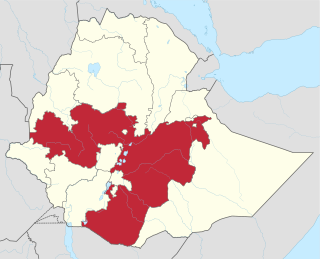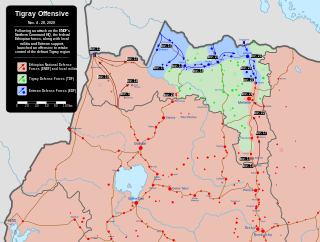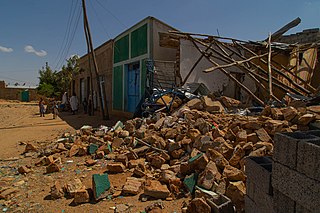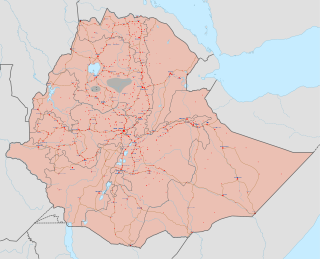
Abiy Ahmed Ali is an Ethiopian politician serving as the third Prime Minister of Ethiopia since 2018, and as a leader of the Prosperity Party since 2019. He was awarded the 2019 Nobel Peace Prize "for his efforts to achieve peace and international cooperation, and in particular for his decisive initiative to resolve the border conflict with neighbouring Eritrea". Abiy served as the third chairman of the Ethiopian People's Revolutionary Democratic Front (EPRDF) that governed Ethiopia for 28 years and the first person of Oromo descent to hold that position. Abiy is a member of the Ethiopian parliament, and was a member of the Oromo Democratic Party (ODP), one of the then four coalition parties of the EPRDF, until its rule ceased in 2019 and he formed his own party, the Prosperity Party.

The 2021 Ethiopian general election to elect members of the House of Peoples' Representatives was held on 21 June 2021 and 30 September 2021. Regional elections were also held on those dates.

The Hachalu Hundessa riots were a series of civil unrest that occurred in the Oromia Region of Ethiopia, more specifically in the hot spot of Addis Ababa, Shashamene and Ambo following the killing of the Oromo musician Hachalu Hundessa on 29 June 2020. The riots lead to the deaths of at least 239 people according to initial police reports. Peaceful protests against Hachalu's killing have been held by Oromos abroad as well. The Ethiopian Human Rights Commission (EHRC) found in its 1 January 2021 full report that part of the killings were a crime against humanity, with deliberate, widespread systematic killing of civilians by organised groups. The EHRC counted 123 deaths, 76 of which it attributed to security forces.

The Tigray War was an armed conflict that lasted from 3 November 2020 to 3 November 2022. The war was primarily fought in the Tigray Region of Ethiopia between forces allied to the Ethiopian federal government and Eritrea on one side, and the Tigray People's Liberation Front (TPLF) on the other.

The Mai Kadra massacre was a massacre and ethnic cleansing carried out during the Tigray War on 9–10 November 2020 in the town of Mai Kadra in Welkait in northwestern Ethiopia, near the Sudanese border. Responsibility was attributed to a pro-TPLF youth group and forces loyal to the Tigray People's Liberation Front (TPLF) in the EHRC-OHCHR Tigray Investigation, preliminary investigations by Amnesty International, the Ethiopian Human Rights Commission (EHRC) and the Ethiopian Human Rights Council (EHRCO), and interviews conducted in Mai Kadra by Agence France-Presse. The Office of the United Nations High Commissioner for Human Rights (OHCHR) and EHRC reported that at least 5 Tigrayans were killed in Mai Kadra by Amhara militas such as Fano in retaliation. Tigrayan refugees in Sudan told multiple news outlets that Tigrayans in Mai Kadra were targeted by either Amhara militias, the Ethiopian National Defense Force (ENDF), or both.

The Mekelle offensive was a military campaign fought between the armed forces of Ethiopia and the Tigray Region to reach the city of Mekelle in the Tigray Region, from 17 November to 28 November 2020. It was part of the Tigray War.
The Ethiopian Human Rights Commission (EHRC) is a national human rights institution (NHRI) established by the Ethiopian government. The EHRC is charged with promoting human rights and investigating human rights abuses in Ethiopia. The EHRC states organizational independence as one of its values. In October 2021, the EHRC's rating by the Global Alliance of National Human Rights Institutions for operation in accordance with the UN Paris Principles was upgraded from grade B to grade A.
This timeline of the Tigray War is part of a chronology of the military engagements of the Tigray War, a civil war that began in the Tigray Region of Ethiopia in early November 2020.
Events in the year 2021 in Ethiopia.

Sexual violence in the Tigray War included, according to the United Nations Special Representative on Sexual Violence in Conflict, Pramila Patten, people forced to rape family members, "sex in exchange for basic commodities", and "increases in the demand for emergency contraception and testing for sexually transmitted infections". As of August 2021, the number of rape victims ranged from a minimum estimate of 512–516 rapes registered with hospitals in early 2021 to 10,000 rapes according to British parliamentarian Helen Hayes and 26,000 women needing sexual and gender-based violence services according to the United Nations Population Fund. Several claims have made implicating both sides of the conflict in the systematic use of rape as a weapon of war against the civilian population.

Casualties of the Tigray War refers to the civilian and military deaths and injuries in the Tigray War that started in November 2020, in which rape and other sexual violence are also widespread. Precise casualty figures are uncertain. According to researchers at Ghent University in Belgium, as many as 600,000 people had died as a result of war-related violence and famine by late 2022. The scale of the death and destruction led The New York Times to describe it in November 2022 as "one of the world’s bloodiest contemporary conflicts."

All sides of the Tigray War have been repeatedly accused of committing war crimes since it began in November 2020. In particular, the Ethiopian federal government, the State of Eritrea, the Tigray People's Liberation Front (TPLF) and Amhara regional forces have been the subject of numerous reports of both war crimes and crimes against humanity.

Following the 2018 dissolution of the ethnic federalist, dominant party political coalition, the Ethiopian People's Revolutionary Democratic Front, there was an increase in tensions within the country, with newly resurgent regional and ethnically based factions carrying out armed attacks on military and civilians in multiple conflicts throughout Ethiopia.
The Humera massacre was an ethnic mass murder event carried out in November 2020 in the town of Humera in the Tigray Region of northwestern Ethiopia, next to the Sudanese border. The massacre took place during an armed conflict between the regional government of Tigray and the federal government of Ethiopia. Refugees attributed the massacre to Amhara militias, including Fano, and the Ethiopian National Defense Force (ENDF).
This Timeline of the Tigray War is part of a chronology of the military engagements of the Tigray War, a civil war that began in the Tigray Region of Ethiopia in early November 2020.
This Timeline of the Tigray War is part of a chronology of the military engagements of the Tigray War, a civil war that began in the Tigray Region of Ethiopia in early November 2020.

Abiy Ahmed's tenure as prime minister of Ethiopia began on 2 April 2018 with his swearing-in at the Ethiopian parliament, succeeding Hailemariam Desalegn. Abiy is the first person of Oromo descent to hold the office, and became chair of the ruling Prosperity Party after the dissolution of the Ethiopian People's Revolutionary Democratic Front (EPRDF) in November 2019.

Since the start of Tigray War in November 2020, the Eritrean government has been heavily involved in the war against the Tigray People's Liberation Front (TPLF) in support of the Ethiopian government.

The events of the Tigray War have sparked numerous reactions and protests worldwide.

The Ethiopia–Tigray peace agreement, commonly called the Pretoria Agreement or the Cessation of Hostilities Agreement (CoHA), is a peace treaty between the government of Ethiopia and the Tigray People's Liberation Front (TPLF) that was signed 2 November 2022, wherein both parties agreed to a "permanent cessation of hostilities" to end the Tigray War. The agreement was made effective the next day on 3 November, marking the two-year anniversary of the war.













